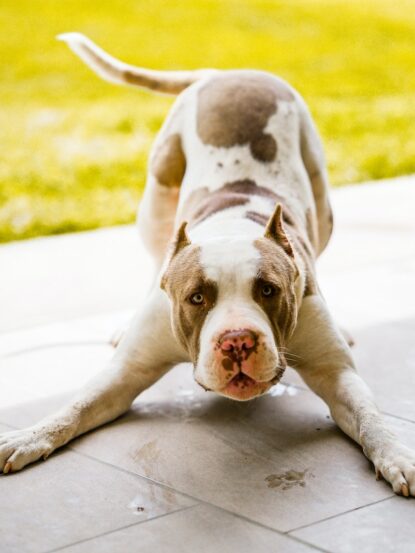menu
Foster a Dog

Save a Life
It's one of the best things you can do...
When you foster a dog, you agree to take a homeless dog into your home and provide them with love, training, care, and attention, You treat them as if they were your own. It's a commitment of time and love to the dog that lasts until adoption.
Why Do Rescue Organizations Need Fosters?
- Most rescues do not have shelter facilities, so foster homes must care for the dogs taken in by the rescue. Many rescues pull dogs from local shelters, freeing up space for other dogs who may be in need of a home.
- Shelters may request that rescue organizations with a foster network take dogs that are not doing well in the shelter environment, have an injury, or have undergone surgery and require additional care.
- A mother with puppies who require special care until they are old enough to go to a forever home.
Why Should You Think About Fostering?
Fostering a dog is one of the most generous and life-changing gifts you can give a dog in need. As well as one of the most rewarding experiences you can have. It not only changes the dog's life, but you will also find that you changed for the better as a result of the experience.
- It is free. In most cases, the rescue organization will cover all of the costs associated with housing a foster dog. Responsible rescues cover vet bills, flea and tick preventative, spay and neuter, and microchipping while the dog is in their care. If you choose to pay for these items yourself, you will save money for the rescue, and it is now a federal tax deduction.
- You make room for another dog at the rescue or shelter.
- Allowing your foster dog the time he or she needs to be ready for adoption. Dogs prefer to be at home rather than in kennels. At home, you can boost their confidence, familiarize them with everyday life, and provide them with a history.
- It allows the shelter or rescue to learn more about the dog and place him in the best possible home. Socializing the dog in a home environment and possibly acquainting him with other pets and different types of people. A dog’s personality, strengths and fears, and suitability for living with children, cats, or other dogs can all be more easily assessed. A dog with a “background” is easier to match with the perfect home.
- For people whose circumstances do not permit permanent ownership, short-term ownership can be an excellent way to enjoy the benefits of a companion dog. Plus, if you’re thinking about getting a dog, it’s a great way to see if you want to commit to a dog long-term.
Prepare yourself to make the time commitment that fostering a dog necessitates. You'll most likely need to train your foster dog as well as work on socialization skills. You want to ensure that your foster puppy is well socialized and behaved so that they have a good chance of being adopted. There are numerous other reasons why you should consider fostering a dog. We have only mentioned a few. If you want to foster a dog, please contact your local rescue organizations or shelters. Most will have a foster care application ready for you.
You may have your own pet at home. Whether it's a dog or a cat, you'll want to make sure your resident pet gets along with your new visitor. If you have a cat, for example, inquire whether the shelter or rescue organization has a way to test how the foster dog reacts to cats. Even if the test goes well, you should keep the dog and cat in separate rooms until the dog is at ease in their new surroundings. When you first meet the dog, keep it on a leash.
It is beneficial to the rescue or shelter if you can provide information about the personality and behavior of your foster dogs. Keep track of their activity levels, habits, and demeanor. This information will assist them in matching your foster dog with a forever family.
Taking in a foster dog is a significant time commitment. Before making that commitment, make certain that both you and the organization are on the same page. Make a list of your top concerns and ask them before agreeing to foster. What about prospective adopters? Who will be in charge of organizing visits? Do you need to attend adoption events with the dog? Will prospective adoptive parents visit your home? Will the organization conduct a background check on them? Can you adopt the dog if you want to?
When a Forever Home is Found
Giving up the animal is the most difficult thing for some foster care volunteers. When the time comes, it can be difficult to say goodbye to the foster dog, but remember that you are only assisting them on their journey to their forever home, and there are many more dogs waiting for that opportunity.
Foster parents are sometimes unable to say good-by and referred to as a "foster failure." While this may appear harsh, it is not! It simply means that the foster and the dog became so close that they decided to adopt their foster dog. It's wonderful when a foster decides that adopting a dog is best for both them and the dog.
When someone decides to adopt the dog, you've done your job and made your foster a success. But if you simply can't say goodbye and want to make your foster dog your new family member, that's also fantastic.

